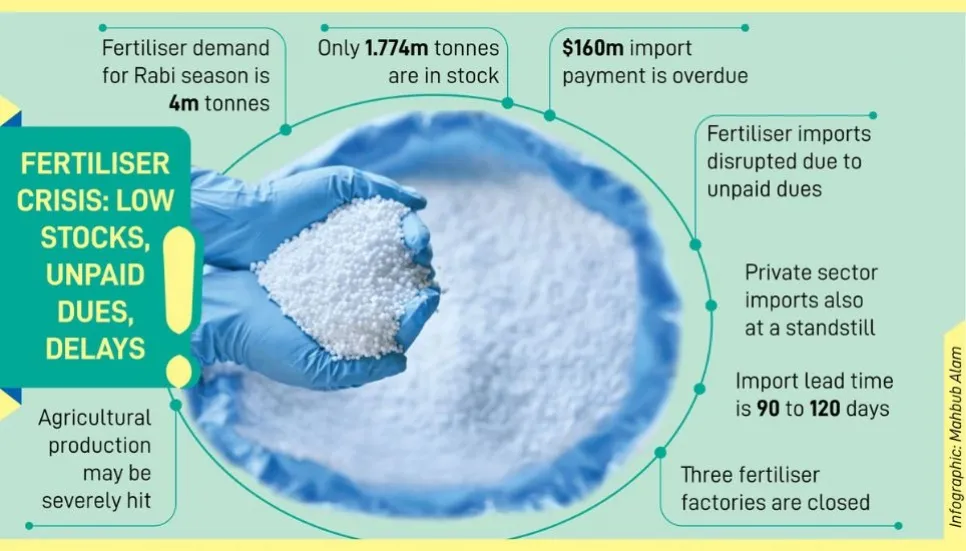Home ›› Economy ›› Agriculture

The Ministry of Agriculture has directed the Bangladesh Agricultural Development Corporation (BADC) to urgently import fertiliser due to inadequate stock levels ahead of the Rabi season. The ministry fears that a fertiliser shortage could severely impact agricultural production if not addressed promptly.
Consequently, Bangladesh Bank and Sonali Bank PLC have been instructed to clear deferred import payments and open new letters of credit (LCs).
According to reliable sources, the current stock of urea fertiliser is expected to last until September, while the stock of non-urea fertilisers should suffice until October.
It has been revealed that as of May this year, BADC has an outstanding payment of approximately $160 million for previously imported fertiliser. Foreign suppliers have expressed their inability to continue supplying fertiliser to Bangladesh until the dues are cleared, and have exerted pressure through their respective embassies for payment.
Sources within the agriculture ministry also indicated that despite calling for tenders for private sector fertiliser imports, a lack of response has been noted due to the ongoing dollar shortage and the prevailing political turmoil of the country. The sector is facing paralysis as foreign confirming banks are unwilling to provide the necessary guarantees for LCs.
Riaz Uddin Ahmed, executive secretary of the Bangladesh Fertilizer Association (BFA), told The Business Post, "We have plans to import 9,50,000 tonnes of fertiliser. However, foreign banks are not clearing our import LCs due to outstanding dues with the government.”
“We hope to receive payment from the government soon, which should resolve the import complications by November," he added.
Govt moves to resolve fertiliser crisis
The government has directed Bangladesh Bank and Sonali Bank PLC to swiftly settle outstanding payments for fertiliser imports made through the BADC. Sonali Bank has also been instructed to open new LCs to facilitate further imports.
It has been reported that the Ghorashal and Shahjalal fertiliser factories are operating at full capacity. Meanwhile, the Jamuna, Ashuganj, and Chittagong urea fertiliser plants are expected to resume full production as soon as gas supplies are restored. Officials indicate that if the government ensures adequate dollar supply, import challenges will be resolved.
Regarding this, Senior Secretary of the Ministry of Industries Zakia Sultana said, "Our factories are ready; however, we have been facing a gas shortage since last Ramadan. We are in ongoing discussions with the energy ministry to restore gas supplies.”
“Last year, our production was also challenging, which led us to lower our production target from 1 million tonnes to 7,00,000 tonnes this year," she added.
In a meeting chaired by the interim government’s chief adviser on August 12, it was decided to ensure the normal supply of fertiliser and prevent any disruption to agricultural production. However, due to import difficulties, the urea fertiliser situation remains precarious.
Sources indicate that approximately 4 million tonnes of fertiliser will be needed for the Rabi season starting in October. If urgent import procedures are not started soon, the 90 to 120-day lead time could cause a severe fertiliser shortage and related issues by October.
Import complications
Since 2008, BADC has been importing non-urea fertilisers under state agreements, using government guarantees to open LCs with state-owned banks. BADC facilitated these imports through Sonali Bank until fiscal year 2023-24.
However, BADC is currently facing several challenges in importing fertiliser. Due to a shortage of US dollars, Sonali Bank has suspended LC issuance since June of this year.
With Sonali Bank unable to facilitate LCs, and on the advice of Bangladesh Bank, BADC proposed opening LCs through Islami Bank Bangladesh PLC. However, Islami Bank has informed BADC that it will not open LCs without a 100 per cent margin.
As BADC lacks its own funds to cover the required margin, fertiliser imports have been at a standstill since June.
Fertiliser demand and stock levels
According to the Ministry of Agriculture, the primary fertilisers used in the country are urea, triple superphosphate (TSP), diammonium phosphate (DAP), and muriate of potash (MOP). The total demand for these four fertilisers for the current fiscal year has been set at 5.9 million tonnes. An additional 9,50,000 tonnes is expected to be supplied by the private sector, bringing the total demand to approximately 6.9 million tonnes.
In contrast to this demand, the government currently holds a stock of 1.774 million tonnes. This includes 6,00,000 tonnes of urea against a demand of 2.7 million tonnes, 3,25,000 tonnes of TSP against a demand of 7,50,000 tonnes, 4,14,000 tonnes of DAP against a demand of 1.5 million tonnes, and 4,31,000 tonnes of MOP against a demand of 9,50,000 tonnes.
Commenting on overall fertiliser management, Agriculture Secretary Dr Mohammad Emdad Ullah Mian said, "We are focusing on fertiliser management for the Boro season. The dollar shortage is an issue, but we have held inter-ministerial meetings on this.
“The Ministry of Finance and Bangladesh Bank governor have assured us that the necessary dollars for fertiliser imports will be prioritised. We hope the problem will be resolved soon," he said.